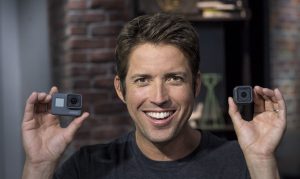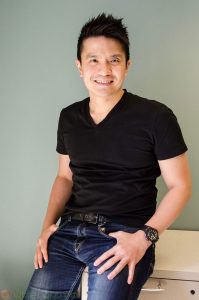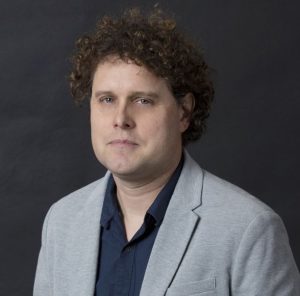Nick Woodman : The Founder of Sports-camera Manufacturing Company ‘GoPro’
Trying, trying, and trying, this is the basic rule to achieve your goals. If you fail once, you have to try harder next time, as giving up will lead you to nowhere, but failure. Except, if you keep trying, there will be a day when you will thank yourself for your own hard work and sustainability. The American businessman Nick Woodman also believes in the power of trying, and after failing in his first two startups, his third startup, ‘Go Pro‘, helped him achieve his dreams, and he finally, built a billion-dollar empire for himself.
Early Life
Woodman was born on 24 June 1975 to Concepcion Woodman and Dean Woodman. He spent his childhood in Menlo Park and Atherton, California. His father founded the Robertson Stephens, an investment bank based in San Francisco. He did his high school from Menlo School. He then attended the University of California, San Diego, where he graduated in visual arts, with a minor in creative writing in 1997.
Experimenting with Startups
Woodman was always curious about starting up his own business, for that he began with an eCommerce website named EmpowerAll.com, which was outlined to sell electronic goods for no more than a $2 profit. But the website could do well for him. Later, he launched a gaming and marketing platform, Funbug, again which could not live up to the mark.
Founding GoPro
It was then when he was travelling to Australia and Indonesia for a trip. He loves surfing, and while surfing in Australia during the tour, he tried to capture his adventure on the camera. He asked his friends to click his pictures while surfing, but they all failed. Later, he tried to take the pictures himself by attaching the camera to his hands with a rubber band, but again it was all in vain.

This incident led him to brainstorm about developing ways to help people with such needs. The idea of developing cameras that can be attached with a belt came into his mind, and Woodman went forward to do the needful to transform the idea into a big business plan.
Woodman borrowed a sewing machine from his mother and started experimenting with different designs to formulate belts for cameras. He also took a loan of $2,00,000 from his father and $35000 from his mother in order to start the business. He also invested his savings, around $10000, obtained from selling the sea-shells, that he had brought from Bali and sold in the California coast, in his startup.
In 2002, he founded GoPro. The name was inspired by the Pro surfers who got their pictures clicked by professional photographers. Initially, the company focussed on developing camera models with ‘point and shoot’ property, in order to get high-quality pictures instantly.
The first model from the company was manufactured by a Chinese company named Hotax. The model was a 35mm film camera, attached with the belt designed by Woodman himself, after a few modifications in the design. The retail cost for the camera was set at $30. In the beginning, he went to sell his camera on his 1971 model Volkswagen bus. With the success of the camera, it went through a few improvements like support for Wifi, waterproof housing and addition of SD card.
After two years from the inception of the company, it got its first big order in 2004, from a Japanese company. In the same year, the total earned revenue of the company was $150,000 and the following year, it raised to $350,000.
In late 2012, Foxconn spent $200 million to purchase 8.88% of the company, making the company value at $2.25 billion and Woodman a billionaire. In the year 2014, the company went public.
Personal Life
Woodman is married to Jill R. Scully and has three children with her. The family lives in Woodside, California. In 2013, he won the national Ernst & Young Entrepreneur of the Year award. He has also been invited to many events as a speaker, to share his experience and some tips as a successful entrepreneur.
Woodman is also in philanthropy and has founded Jill + Nicholas Woodman Foundation, a charitable trust in the Silicon Valley.

Yashica is a Software Engineer turned Content Writer, who loves to write on social causes and expertise in writing technical stuff. She loves to watch movies and explore new places. She believes that you need to live once before you die. So experimenting with her life and career choices, she is trying to live her life to the fullest.




